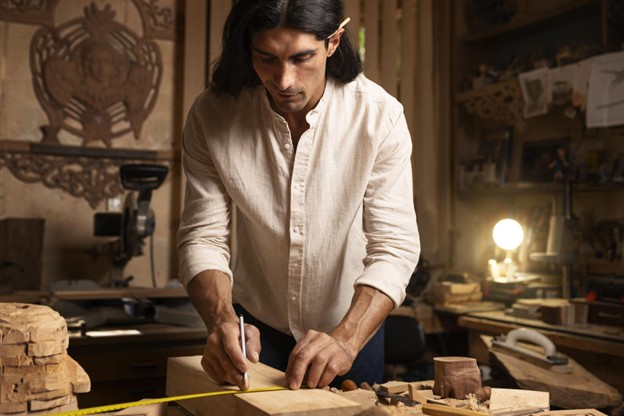In the fast-paced tech industry, woodworking principles offer timeless strategies for building innovative, user-focused products. David Ohnstad reflects a unique blend of craftsmanship and product management, where precision and creativity converge. The National Woodworking Association highlights that craftsmanship fosters meticulous attention to detail, a skill transferable to product development. This article explores how woodworking’s core tenets, precision, iteration, and artistry, enhance product management, driving sustainable success and meaningful outcomes.
Precision as the Foundation of Excellence
Thought leaders in product management emphasize precision as a cornerstone of success, akin to a woodworker’s exact measurements. Just as a craftsman ensures every cut aligns perfectly, product managers must define clear objectives and specifications. This disciplined approach creates reliable, high-quality outcomes.
- Accurate Planning: Precise product requirements mirror exact blueprints.
- Error Minimization: Careful execution reduces costly rework in development.
- Stakeholder Alignment: Clear specifications ensure team unity, like a well-fitted joint.
- Quality Assurance: Meticulous testing reflects a craftsman’s final polish.
Precision in product management, inspired by woodworking, ensures robust, user-ready solutions.
Iterative Improvement Through Craftsmanship
Woodworking thrives on iterative refinement, a principle vital to product management. Industry experts note that iterative cycles, like sanding and reshaping wood, allow teams to refine features based on feedback. This process fosters continuous improvement and adaptability in dynamic markets.
- Feedback Loops: User input refines products, like sanding smooths edges.
- Prototyping Parallels: Early models test ideas, akin to rough wood sketches.
- Incremental Progress: Small adjustments yield polished, market-ready products.
- Adaptable Strategies: Iterative cycles respond to evolving user needs.
This iterative approach ensures products evolve with precision and purpose.
Creativity as a Catalyst for Innovation
Craftsmanship celebrates creativity, a trait essential for groundbreaking product management. Visionaries argue that a woodworker’s ability to envision unique designs mirrors a product manager’s role in crafting innovative solutions. This creative mindset drives differentiation in competitive tech landscapes.
- Visionary Design: Unique product features echo distinctive wood creations.
- Problem-Solving Artistry: Creative solutions address complex user challenges.
- User-Centric Innovation: Empathetic design reflects a craftsman’s care.
- Aesthetic Functionality: Balancing form and utility enhances user experience.
Creativity inspired by woodworking fuels innovative, user-focused products.
Building Trust Through Quality Craftsmanship
In woodworking, quality builds trust, a principle that strengthens product management. Thought leaders highlight that delivering reliable, well-crafted products fosters stakeholder confidence, much like a durable piece of furniture. This trust drives user loyalty and team cohesion.
- Reliable Delivery: Consistent quality mirrors a craftsman’s dependable work.
- Stakeholder Confidence: Transparent processes build trust, like visible wood grain.
- User Loyalty: High-quality products encourage repeat engagement.
- Team Morale: Quality outcomes boost collaborative pride.
Quality craftsmanship in product management creates lasting stakeholder relationships.
Sustainability in Design and Development
Woodworking’s sustainable practices offer lessons for ethical product management. Industry insights suggest that resource-efficient craftsmanship aligns with creating products that prioritize longevity and minimal waste. This approach ensures sustainable, impactful solutions.
- Resource Efficiency: Lean development mirrors careful wood selection.
- Long-Term Viability: Durable products reflect sturdy craftsmanship.
- Ethical Practices: Sustainable design respects users and environments.
- Waste Reduction: Iterative testing minimizes costly errors.
Sustainable principles create products that endure and benefit communities.
Collaboration as a Crafted Process
Woodworking often involves collaboration, from sourcing materials to refining designs, a model for product management teamwork. Experts emphasize that cross-functional collaboration, like a craftsman’s partnership with suppliers, drives cohesive product development and innovation.
- Cross-Functional Synergy: Teams align like artisans on a shared project.
- Shared Vision: Unified goals mirror a craftsman’s design intent.
- Feedback Integration: Stakeholder input refines outcomes, like peer reviews.
- Collective Ownership: Collaborative efforts foster pride in results.
This collaborative approach ensures products reflect diverse expertise and unity.
Balancing Art and Function in Product Design
Woodworking balances aesthetics and utility, a principle critical to product management. Thought leaders note that successful products combine user delight with practical functionality, much like a beautifully crafted, functional chair. This balance enhances market success.
- User Experience Focus: Aesthetic design improves engagement, like polished wood.
- Functional Reliability: Practical features ensure consistent performance.
- Iterative Refinement: Balancing form and function through testing.
- Market Appeal: Artful design differentiates products in competitive spaces.
This balance creates products that are both delightful and dependable.
Fostering Resilience Through Craftsmanship
Craftsmanship teaches resilience, a vital trait for product managers facing setbacks. Industry leaders highlight that a woodworker’s persistence through mistakes mirrors navigating product challenges, fostering adaptability and growth in high-pressure environments.
- Error Recovery: Learning from failures refines product outcomes.
- Persistent Effort: Long-term projects build endurance, like complex woodwork.
- Creative Problem-Solving: Overcoming obstacles sparks innovative solutions.
- Mindset Growth: Viewing challenges as opportunities enhances resilience.
Resilience inspired by craftsmanship drives product management success.
Conclusion: Crafting Impactful Product Management
Woodworking principles, precision, iteration, creativity, and resilience offer a powerful framework for product management. By embracing these tenets, product managers create user-focused, sustainable solutions that stand the test of time. From fostering collaboration to balancing art and function, this crafted approach transforms challenges into opportunities, shaping a future where products are as enduring and impactful as finely crafted woodwork.
